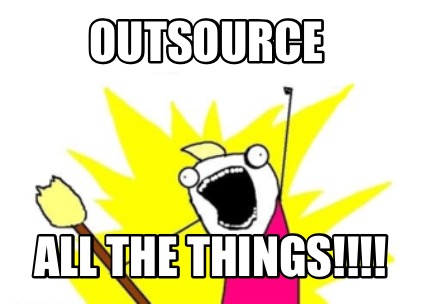5 good reasons that you can’t outsource being a good writer, no matter what job you have
 If you’re a technical writer, marketing copywriter, or analyst, your job revolves around writing. Of course you need to write well. But why does it matter for the rest of the working world?
If you’re a technical writer, marketing copywriter, or analyst, your job revolves around writing. Of course you need to write well. But why does it matter for the rest of the working world?
I was recently at an innovation-focused gathering and got into a conversation with a public relations professional. When I explained what “Writing Without Bullshit” was, we had this conversation:
PR pro: “Oh, those startup guys are terrible writers. That’s my job, to interpret what they are trying to say.”
Me: “I work with some of those startups. They get a lot of value out of learning to express themselves more clearly.”
PRP: “That’s hopeless. Don’t bother. They should concentrate on what they do and leave the writing to me.”
Me: “So you think writing is a job for writing professionals only.”
PRP: “Of course. If they think that’s their job, then they wouldn’t need me. And believe me, they need me.”
Why”Leave the writing to professionals” is a misguided sentiment
I found this conversation disturbing, because it seemed so wrong in so many ways. If writing is not your job, why bother learning to write better? Here are 5 good reasons:
- You need to persuade. Every businessperson needs to get colleagues, partners, or others to help them. If you’re a startup, you’ll need to convince people to invest in you. If you’re a customer service worker, you’ll need to send clear communications to customers. No matter who you are, you’re better off if you can persuade your managers, colleagues, and subordinates to help you in your job. If you can’t write, you’re at a disadvantage.
- You send emails. Everyone does. Every email has a job to do. The better you write, the more likely it is to do that job properly. Do you really think you can outsource your emails?
- You need to communicate better with the writing professionals. If you’re working with a PR person or a marketing copywriter, how will you communicate what you want? It’s a lot easier for a pro like that to take good writing and make it great, than to take a squishy set of notes and conversations and turn them into something persuasive. Writing pros will get further if you start them with something that’s already pretty good. (This is why my conversation with the PR pro seemed so strange.)
- You won’t be in the same job forever. Let’s say you’re a coder. Do you want to be a manager someday? Do you want to start your own company? What if you get laid off — how will you persuade your next boss that you’re any good? Jobs change; people progress. At some point — and it’s probably going to be soon — you’ll need writing skills to go along with your other skills.
- Clear writing enhances clear thinking. You think you know what you’re trying to say? Well, write it down. You’ll find holes in your argument and new ways of expressing your idea. Clear writing creates discipline, not just in communication, but in the concepts that underlie that communication. If you want to make sure you’re thinking clearly, write down your idea.
Ann Handley wrote a great book called “Everybody Writes.” My belief is that everybody ought to write. Those who “leave it to the professionals” will spend their whole careers hamstrung by a weakness. If you work in an office, you can’t outsource clarity in communication.
“If you can’t write, your at a disadvantage”
Not sure if deliberate or not 🙂
Mortifying! Thanks.
No worries. Been following your blog for a while now and working hard to prune out all the weasel words from my techie emails, helps me sound more assertive and clear. Keep up the good work!